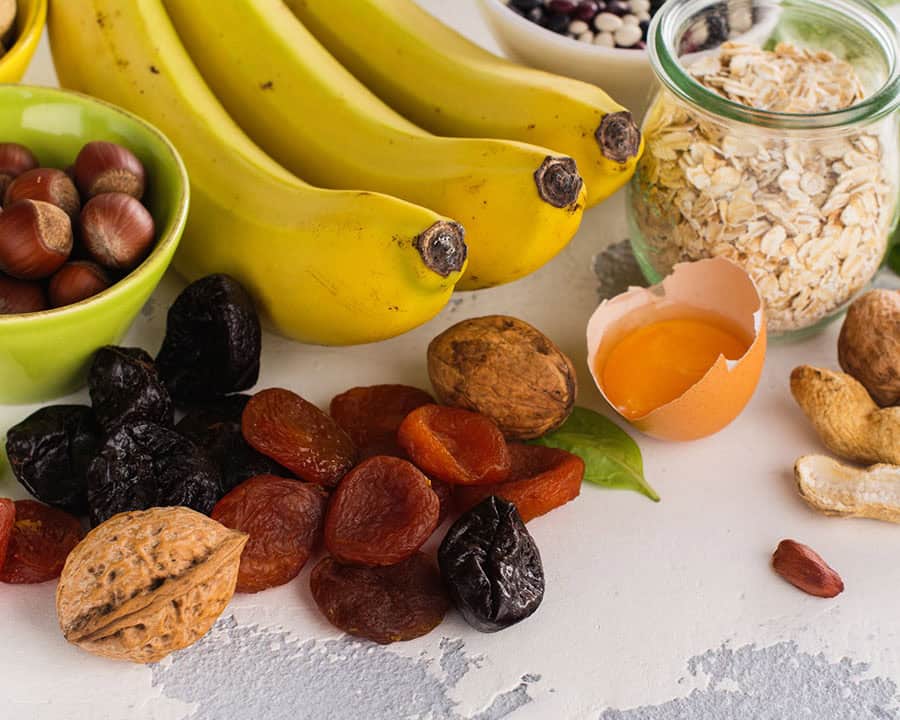Feeling sluggish? Like you’re constantly running on empty? While there can be many reasons for fatigue, one key player in your energy levels might be something you often hear about: potassium.
Here at Bellefleur Physiotherapy in Ottawa, we believe in empowering you with the knowledge to understand your body better. So, let’s dive into how this essential mineral, potassium, helps unlock the energy you need to move, thrive, and enjoy life to the fullest.
The Spark Plug of Your Cells: Potassium and Energy Release
Think of your body’s cells as tiny powerhouses. Just like any engine, they need fuel to run. This fuel comes from the food you eat, primarily carbohydrates, fats, and proteins. But the process of turning that fuel into usable energy isn’t a simple one. It involves a complex interplay of chemical reactions within your cells.
This is where potassium steps in. It plays a crucial role in maintaining the electrolyte balance across your cell membranes. Electrolytes are electrically charged minerals that help conduct nerve impulses, contract muscles (including your heart!), and, importantly, transport nutrients into your cells while carrying waste products out.
Potassium, with its positive charge, works in tandem with sodium (another electrolyte) to create what’s known as the sodium-potassium pump. This pump actively moves sodium out of the cell and potassium into the cell. This constant movement generates an electrical gradient, a form of potential energy that your cells can then harness to perform their various functions, including the chemical reactions involved in releasing energy from the food you consume.
Essentially, potassium helps create the electrical conditions necessary for your cells to efficiently convert the energy stored in your food into the energy your body can use. Without sufficient potassium, this process can become less efficient, leaving you feeling tired and drained.
Beyond Bananas: Delicious Sources of Natural Potassium
While bananas are often the first food that comes to mind when we think of potassium, there’s a whole world of delicious and nutritious options to help you meet your daily needs. Incorporating a variety of these foods into your diet will not only boost your potassium intake but also provide a wealth of other essential vitamins and minerals.
Here are some excellent natural sources of potassium:
- Fruits: Bananas, oranges, cantaloupe, honeydew melon, apricots, prunes, raisins, avocados
- Vegetables: Sweet potatoes, white potatoes (with skin!), spinach, broccoli, Brussels sprouts, peas, tomatoes, beetroot
- Legumes: Beans (kidney, lima, white), lentils
- Dairy: Milk, yogurt
- Fish: Salmon, tuna, halibut
 Aim to include a good mix of these foods throughout your day to ensure you’re getting enough potassium to support your energy levels and overall health.
Aim to include a good mix of these foods throughout your day to ensure you’re getting enough potassium to support your energy levels and overall health.
Kicking Fatigue to the Curb: The Potassium Connection (and More!)
Fatigue can be a debilitating symptom that impacts your daily life. While a potassium deficiency can certainly contribute to feelings of tiredness and weakness, it’s important to remember that fatigue can have various underlying causes.
To help avoid fatigue, consider the following alongside ensuring adequate potassium intake:
- Maintain a Balanced Diet: Focus on whole, unprocessed foods that provide sustained energy release. Don’t skip meals, and ensure you’re getting enough carbohydrates, healthy fats, and protein.
- Stay Hydrated: Dehydration can lead to fatigue. Drink plenty of water throughout the day.
- Prioritize Sleep: Aim for 7-9 hours of quality sleep each night. Establish a regular sleep schedule to regulate your body’s natural rhythms.
- Manage Stress: Chronic stress can drain your energy. Incorporate stress-reducing activities like exercise, mindfulness, or spending time in nature.
- Regular Physical Activity: While it might seem counterintuitive, regular exercise can actually boost your energy levels in the long run. Start slowly and gradually increase the intensity and duration of your workouts.
- Listen to Your Body: Don’t push yourself too hard when you’re feeling tired. Allow yourself time to rest and recover.
Bellefleur Physiotherapy: Supporting Your Well-being
At Bellefleur Physiotherapy in Ottawa, we’re committed to helping you achieve optimal health and well-being. If you’re experiencing persistent fatigue or have concerns about your energy levels, we encourage you to consult with your doctor to rule out any underlying medical conditions.
Understanding the role of essential nutrients like potassium in energy release is a crucial step towards taking control of your health. By incorporating potassium-rich foods into your diet and adopting healthy lifestyle habits, you can help fuel your body and keep fatigue at bay.
Do you have any questions about nutrition and its impact on your physical well-being? Don’t hesitate to reach out to us at Bellefleur Physiotherapy – we’re here to support you on your journey to a healthier, more energized you!







